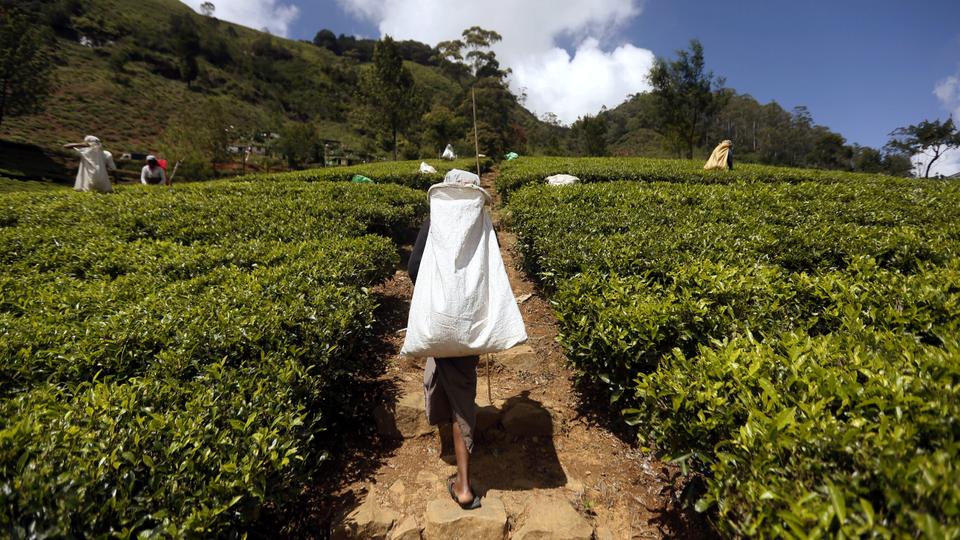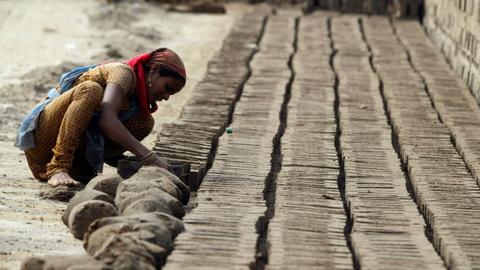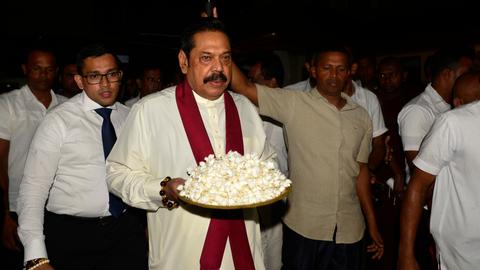CANADA HAS A LARGE TAMIL DIASPORA
UN says contemporary forms of slavery exist in Sri LankaUN special rapporteur Obokata said about 1 percent of Sri Lankan children are involved in some type of child labor, most of it considered hazardous.

Women and girls are disproportionately affected by contemporary forms of slavery, with females predominantly filling jobs in demanding sectors such as plantation, garment industry and domestic labour. (Reuters)
A UN expert says contemporary forms of slavery exist in Sri Lanka, with vulnerable groups such as children, women, ethnic minorities and older people particularly affected.
Tomoyo Obokata, the UN special rapporteur on contemporary forms of slavery, said Friday at the end of a mission to Sri Lanka that he hopes to submit a report to the UN Human Rights Council in September next year.
“Girls and boys work in the domestic sector, in hospitality, cleaning in the general service industry. Others are sexually exploited in the tourism sector," he said.
Child labor is particularly severe in areas populated by ethnic minority Tamils, such as in tea and rubber planation regions where children are forced to drop out of school and support their families, he said.
The office of the UN High Commissioner for Human Rights says contemporary forms of slavery include traditional slavery, forced labor, debt bondage, serfdom, children working in slavery or slavery-like conditions, domestic servitude, sexual slavery and servile forms of marriage.
“I witnessed that in Sri Lanka contemporary forms of slavery have an ethnic dimension," Obokata said. “In particular, Malayaha Tamils, who were brought from India to work in the plantation sector 200 years ago, continue to face multiple forms of discrimination based on their origin.”
READ MORE: Sri Lanka breaks up Tamil memorial of civil war dead
Tamils are in poor conditions
He said the planation Tamils' inability to own land has forced them to live in “line houses” built during colonial times.
"I was frankly very much distressed by the way they are living. Five to 10 people stuffed in tiny spaces. No proper kitchen or toilet or shower facilities, just appalling conditions. I have recommended to the government to do something about this because frankly, I was distraught myself,” Obokata said.
Government officials were not immediately available for comment.
Women and girls are disproportionately affected by contemporary forms of slavery, with females predominantly filling jobs in demanding sectors such as plantation, garment industry and domestic labor, he said.
In the plantation sector, women must meet daily targets to earn the minimum daily wage, Obokata said.
“Similarly, increasingly high targets in the garment sector put continuous pressure on the female workers. As a consequence, some even choose not to go to the bathroom in order to meet the targets," he said.
In some cases, such as in the planation sector, older workers are compelled to regularly perform physically challenging work because younger people choose to be employed outside the sector. They have no access to adequate health care, social protection, or paid sick leave, he said.
READ MORE: Sri Lankan government tortured Tamil political detainees, report says
A UN expert says contemporary forms of slavery exist in Sri Lanka, with vulnerable groups such as children, women, ethnic minorities and older people particularly affected.
Tomoyo Obokata, the UN special rapporteur on contemporary forms of slavery, said Friday at the end of a mission to Sri Lanka that he hopes to submit a report to the UN Human Rights Council in September next year.
“Girls and boys work in the domestic sector, in hospitality, cleaning in the general service industry. Others are sexually exploited in the tourism sector," he said.
Child labor is particularly severe in areas populated by ethnic minority Tamils, such as in tea and rubber planation regions where children are forced to drop out of school and support their families, he said.
The office of the UN High Commissioner for Human Rights says contemporary forms of slavery include traditional slavery, forced labor, debt bondage, serfdom, children working in slavery or slavery-like conditions, domestic servitude, sexual slavery and servile forms of marriage.
“I witnessed that in Sri Lanka contemporary forms of slavery have an ethnic dimension," Obokata said. “In particular, Malayaha Tamils, who were brought from India to work in the plantation sector 200 years ago, continue to face multiple forms of discrimination based on their origin.”
READ MORE: Sri Lanka breaks up Tamil memorial of civil war dead
Tamils are in poor conditions
He said the planation Tamils' inability to own land has forced them to live in “line houses” built during colonial times.
"I was frankly very much distressed by the way they are living. Five to 10 people stuffed in tiny spaces. No proper kitchen or toilet or shower facilities, just appalling conditions. I have recommended to the government to do something about this because frankly, I was distraught myself,” Obokata said.
Government officials were not immediately available for comment.
Women and girls are disproportionately affected by contemporary forms of slavery, with females predominantly filling jobs in demanding sectors such as plantation, garment industry and domestic labor, he said.
In the plantation sector, women must meet daily targets to earn the minimum daily wage, Obokata said.
“Similarly, increasingly high targets in the garment sector put continuous pressure on the female workers. As a consequence, some even choose not to go to the bathroom in order to meet the targets," he said.
In some cases, such as in the planation sector, older workers are compelled to regularly perform physically challenging work because younger people choose to be employed outside the sector. They have no access to adequate health care, social protection, or paid sick leave, he said.
READ MORE: Sri Lankan government tortured Tamil political detainees, report says

How Indian women silently suffer the consequences of unpaid work
Sri Lanka opposition supporters block roads over sluggish economy and polls
Sri Lanka president sacks prime minister, appoints strongman

Sri Lanka crisis deepens as president suspends parliament
Sri Lanka parliament speaker refuses to accept Rajapaksa as PM
No comments:
Post a Comment